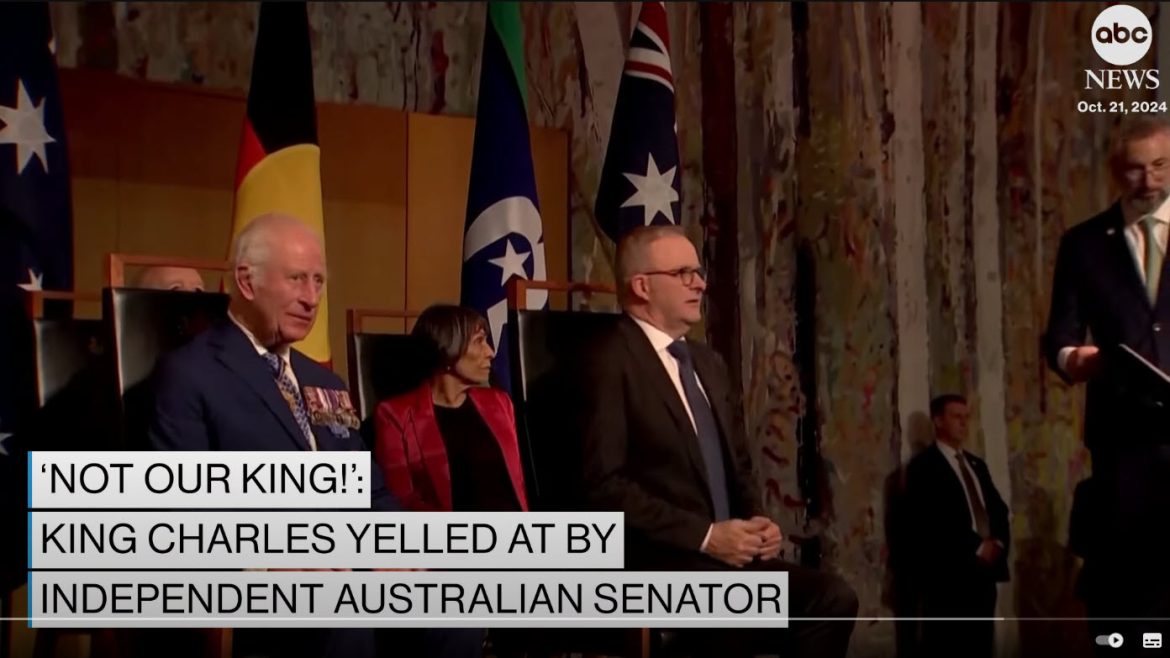King Charles III faced a tense confrontation during his visit to Australia’s parliament on Monday when Indigenous Senator Lidia Thorpe loudly interrupted the royal event, shouting that Australia is not his land. The incident occurred during a parliamentary reception in Canberra, where the king and Queen Camilla were greeted by lawmakers and officials as part of their diplomatic tour.
Thorpe, a vocal advocate for Indigenous rights, challenged King Charles on the legacy of British colonization, accusing the monarchy of benefiting from the theft of Indigenous lands and resources. Her outburst included a sharp rebuke, stating, “This is not your land, and the bones of our ancestors lie underfoot.”
Security quickly intervened, and Thorpe was escorted from the reception. As she was being removed, she continued to denounce the history of British colonization and its ongoing impact on Australia’s Indigenous populations. The senator, a member of the Australian Greens Party, has been a staunch critic of the British monarchy and its historical ties to the colonization of Australia, which began in 1788.
The confrontation adds a new layer of tension to King Charles III’s trip, which is part of his broader efforts to strengthen ties with Commonwealth nations following his ascension to the throne. Australia, a member of the Commonwealth, continues to grapple with its colonial past, and Thorpe’s actions have drawn both praise and criticism.
In a statement following the incident, Thorpe defended her protest, asserting that the British monarchy continues to symbolize oppression for Indigenous Australians. “My ancestors’ land was stolen, and today I made it clear that their pain and struggle should not be ignored,” she said.
While some Indigenous leaders have expressed support for Thorpe’s message, calling it a necessary reminder of Australia’s colonial history, others have questioned the timing and method of her protest. Government officials, including Prime Minister Anthony Albanese, have yet to comment directly on the confrontation, though the Australian government has been increasingly focused on addressing Indigenous issues, including efforts toward constitutional recognition of Indigenous peoples and a proposed referendum for an Indigenous Voice to Parliament.
The British royal family has faced growing scrutiny in several Commonwealth nations over its colonial legacy, and this incident in Australia is the latest in a series of challenges for King Charles as he navigates his role in a modern monarchy. While many Australians still support the Commonwealth ties, there is a growing republican movement in the country that advocates for Australia to become a republic and sever formal ties with the British monarchy.
King Charles did not respond directly to Thorpe’s outburst during the event, but sources close to the palace have suggested that the monarch is aware of the complex colonial history associated with his family’s legacy and has expressed an openness to dialogue on such matters in the past.
As King Charles III continues his tour of Australia, the incident has sparked renewed conversations about the country’s relationship with the British monarchy, Indigenous rights, and the ongoing push for reconciliation with Australia’s First Nations peoples.



